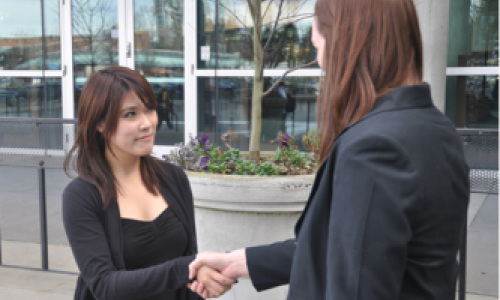
"It is not our abilities that show what we truly are, it is our choices."
Harry Potter and the Chamber of Secrets (2002) – Dumbledore (Richard Harris)
When initiating a self-directed work search you will want to examine all your options to make a sound decision about which field or employment specialization you want to focus your job search on. In addition to doing some self-discovery activities and building your network, another way to ensure that you are heading in the right direction in any given industry is to conduct informational interviews.
Informational interviews are not like regular job interviews but are meant for you to ask questions to a person working in your chosen field and get an inside glimpse into a typical day of work in a particular position, to find out what the person likes and dislikes about his or her job and other inside information about a particular profession or organization. From your network, you may be able to find someone you know who either works in your chosen field, or one of your contacts may know a person who works in that field.
Hopefully, you have a contact within your network, but if you don’t you can always research the appropriate person to contact within a company and then try calling them directly or introducing yourself via email. For a few great ways to start your research, you could:
Look into the member lists of industry associations
Ask your professors, Co-op Coordinators and Career Advisors about SFU Alumni from your area of study who would be willing to meet for an informational interview
Keep in mind that most professionals can get hundreds of emails per day, so it may be more personable to call them directly. When approaching a potential contact remember to be polite, concise and humble. I appreciate that many people are very busy, but if approached in the right way, and with the right attitude, most people are happy to help.
If you are a part of the Co-op Program, your Co-op Coordinator can provide you with a letter of introduction that you can send to potential contacts to inform them about your student status, work search goals and about the Co-op Program.
Once you establish a time and date for the interview, be sure to treat it just like you would any other interview: dress appropriately, respect their time, have your questions prepared. You may wish to bring a resume and/or business card but only give it to them if they ask you for it. This contact could be a potential employer in the future so go about setting a good, lasting impression.
Examples of the kinds of questions you might consider asking are:
-
What does a typical day look like
-
How did they get the position
-
What kinds of skills are required in this position and how did they acquire the skills
-
Suggestions for experience
-
Likes and dislikes about job, field, industry
-
Future prospects of the company, future prospects for jobs
-
Company mandate/philosophy
During the interview be sure to maintain friendly eye contact, listen, take notes and keep the conversation friendly but focused on the person’s job/career. Near the end of the interview, you can ask them for further contacts or referrals to help build your network and also check to see if it would be alright to maintain contact with them.
Once your interview has concluded, take a few moments to sit down, reflect and tidy up your notes. This practice of note-taking and post-interview reflection will be invaluable in future work searches. Be sure to follow up with a thank you card to your contact within a week.
Based on your research you should now be able to mindfully choose which would be the best field and/or which would be the best company to target your self-directed work search towards; you also may find yourself empowered by the whole process of initiating a self-directed work search. The skills you have acquired in the whole process are skills that will serve you for the rest of your life! Keep in mind that if you would like to find out more about any of these self-directed work search topics you can attend the self-directed work search workshop offered by Co-op or Career Services or book a meeting to discuss your work search goals.
Beyond the Blog
-
Informational Interviews from Canadian Careers.
- Check out the rest of Heather's invaluable advice, in the Self-Directed Co-op Guide.
















